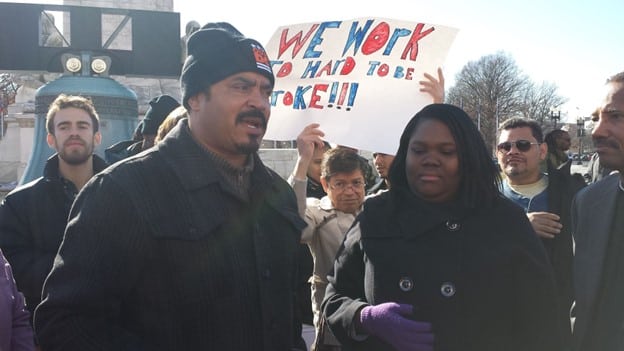Justice for Workers in their Workplaces

You shall not withhold the wages of poor and needy laborers, whether other Israelites or aliens who reside in your land in one of your towns — Deuteronomy 24:14
Justice for Workers
Our economic system and cultural values often do not align with the dignity and worth that God gives all of creation. For workers, it looks like not having a livable wage, inadequate health insurance, poor work conditions, wage theft, insurmountable debt from education to help in earning a higher wage, lack of paid family and medical leave, and barriers to collective bargaining and union participation, among other things.
We know that our loving God cares about all aspects of our lives, including our work lives. Conditions and events at work absorb our energy, occupy our minds, and impact our psyches when we are both at work and home. Our work situations can be fulfilling and empowering, or demeaning and humiliating. For many of us, our job is the main factor determining the size of our income, whether we have health insurance and a pension, whether we live in a big house or any house at all, and whether we send our children to college or to bed with an empty stomach.
Some workers confront particularly unjust situations such as extremely low pay, unsafe conditions, racism, or sexism. All workers, whatever their position in the hierarchy of jobs, may suffer from indignities, large and small, that cripple their spirit and hinder their journey to greater wholeness.
One-quarter of all jobs in the U.S. pay wages so low that a full-time worker cannot keep a family out of poverty. For some, the biggest problem is no job at all. Even when the economy is considered to be “strong,” millions of people who want to work cannot find a job or can only find a part-time one.
God’s reign does not stop at the door to the workplace. The Church, the body of Christ, is called to seek out and accompany people wherever they are. So the church must also be in our offices, factories, stores, farms, schools, and all the places where people work.
June 20, 2022
Witnesses with the World’s Workers
June 20, 2022
Join us as we hear the testimonies of union workers and workers in the “informal” economies of the world. Rev. Sekinah Hamlin, Minister for Economic Justice at the United Church of Christ, will be joined by leaders representing informal economy workers in Zimbabwe, representatives from the National Farm Worker Ministry, migrant workers, union workers, and more. Learn key ways you and your church can help support and educate about worker justice rooted in the UN Sustainable Development Goals, including ways of participation in this year’s Labor in the Pulpit.
Support Labor Unions
June 15, 2021
Mind the Gap: Worker Justice, Wage, Medicaid, and the Right to Organize
June 15, 2021
Labor unions are an important way that workers can improve their wages and working condtions, and gain greater dignity on the job. Traditional labor unions continue to organize and struggle to improve workers’ lives. But forming a traditional union is nearly impossible in the current political and legal climate, even though the right to do so is an internationally-recognized human right. So workers are creating alternative worker organizations. For an overview see Alt-Labor
by Josh Eidelson in the February 2013 issue of The American Prospect; the article describes and tells the stories of some of these alternative labor organizations and the courageous workers who are behind them. These groups, which welcome our support, are active in multiple locations around the country.
Warrior Met Strike

The UCC Justice & Witness Ministries has been working with the Interreligious Network for Worker Solidarity and the Alabama Poor People’s Campaign to raise awareness around Warrior Met strike. The coal miners in Alabama have been on strike for more than a year. The Warrior Met strike is the longest in state history and that labor unions and faith leaders will continue to push for more visibility and solidarity for the coal miners as the strike continues.
Churches and congregations can stand with Warrior Met workers through this statement of support.
Justice for Farm Workers
Farmworkers and migrant workers provide our nation with food, but are exploited and underpaid. UCC Economic Justice Ministries partners with the Florida-based Coalition of Immokalee Workers, who are on the frontline of the fight for fair treatment of farmworkers through the Fair Food Program. The UCC supports the Coalition’s Wendy’s Boycott, which is an effort to persuade the company, headquartered in Ohio, to join the Fair Food Program, committing to only buy from farms that follow just labor practices.
Labor in the Pulpit
The UCC also is partnering with the AFL-CIO, United Mine Workers of America and other unions to offer education on workers’ rights and justice issues. Through the Labor in the Pulpit program, local union members are invited to participating churches to speak to congregations.
Church members hear testimony directly from workers about their experiences, struggles and hopes. Most importantly, they can learn how to support these laborers in their own communities.
To schedule a visit from a labor union member, church leaders can use this form.
Ways your church can support workers and their families TODAY
Act Right Now …
- Prayer is protest. Add a prayer for workers around the world to be used in our advocacy for workers.
- Defend the Right to Organize! Add your support to the Pro Act legislation.
- Become and Economic Justice Champion!
Listen! The wages of the laborers who mowed your fields, which you kept back by fraud, cry out, and the cries of the harvesters have reached the ears of the Lord of hosts. James 5:4 (NRSV Updated)
Talk to your Church …
- Have a labor union member from your area speak about their experience in worship.
- Ready your church for this year’s Harvest for Justice on Child Labor in Agriculture.
- Ready your church for this year’s Neighbors in Need offering which will focus on workers.
- Sign the Statement of Support for the Warrior Met strike as a church.
Dig Into the Issues …
- Learn about the stories of migrant workers and informal economy workers around the world.
- Learn about female workers and poverty.
- Learn about the connection between wages, Medicaid expansion, and the right to organize.

Questions?
Please contact Sekinah Hamlin, UCC Minister for Economic Justice at Hamlins@ucc.org or join the UCC Economic Justice Champions to get updates about educational events and opportunities to take action.